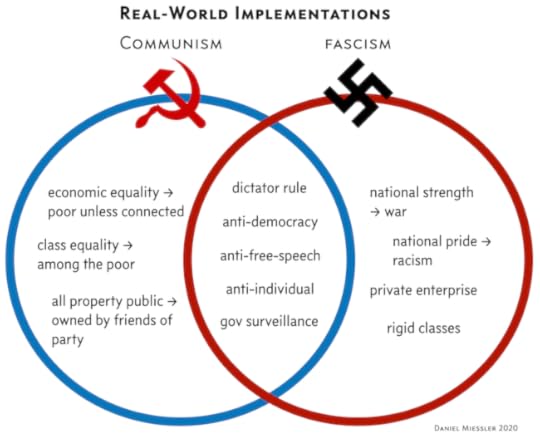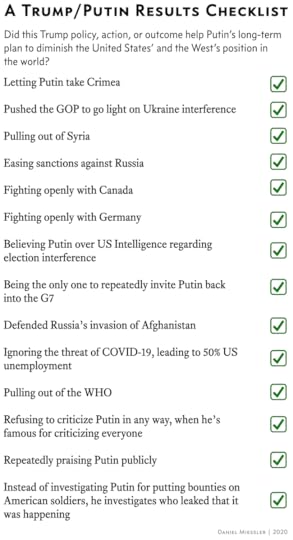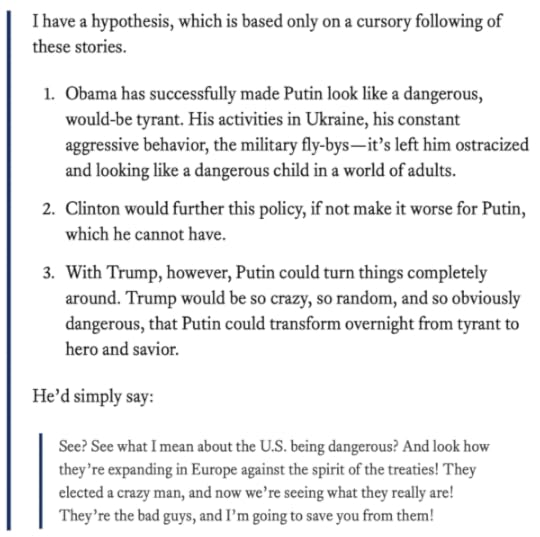Daniel Miessler's Blog, page 66
July 15, 2020
I Want to Make Art

I’m coming to the realization that I badly want to make art.
Not art like I thought art was when I was a kid—which basically meant painting—but art in the sense of making people experience the wild dimensions in life in unique ways. For me that means making music and writing stories.
Of course I still want to continue to exploring and discussing and explaining things, but I think that’s a conversation that vibrates at the frequency of thought and ideas. And that’s awesome. I love it. But I think it’d like to come at those same ideas from the perspective of emotion instead of logic.
I feel like, just as with debate, you cannot truly sway someone with mathematical proofs; you win them with emotion. And I know that’s often abused to convince people of untruths. I don’t want to do that.
I want to help people explore higher states of existence, and happiness, and sensation, and connectedness through music and stories.
I’m also intellectually challenged by the impossibility of doing so. I cannot think of anything more difficult than writing good fiction, or creating a song that moves people. Or at least, not that I’d want to do.
So this is a message to myself, and a reminder to you, that this is the path I am becoming increasingly drawn to.
Please, don’t let me ignore the call for too long.
—
If you get value from this content, you can support it directly by becoming a member. Being a member gets you access to the newsletter every week instead of just twice a month, access to the UL Slack Channel, the UL Book Club, the UL Archives, and access to future member-only content.


July 14, 2020
The Human Obsession With Rarity

Humans are obsessed with rarity, and I want to explore why. But before we get too far, let’s look at some examples.
Only 1% of people have grey eyes.
Platinum vs. Copper
People over 7 feet tall
Grey, green, and blue eyes
Limited edition sports cars
Millionaires
Haley’s comet
The Crown Jewels
Solar Eclipses
4-leaf Clovers (those might not exist, haven’t checked)
Some of these are rare in occurrence, i.e., low in number, and others are rare in time—meaning they show up infrequently and/or there’s a limited window in which to enjoy them.
Both are examples of rarity.
You could also have zero interest in a video on your shelf, but watch the same movie if it’s on TV.
Evidently I’ve been on about this for a long time, because here’s what I noticed about TV in 1997.
Why is it that nothing at all is of interest when you have 40 channels of T.V. in perfect clarity, yet when your cable goes out and you only have one channel full of static, your attention is riveted regardless of what’s playing?
I know the answer. We want what we can’t have and we lose interest in anything we possess completely. You’d be very surprised at how many things in life this applies to.
We Want What’s Transient, Daniel Miessler, February 1997
I think the reason for this comes directly from evolution.
Evolution is always looking for markers of winning, and it rewards people when they acquire them.
If everyone in your band of fighters has bronze weapons, and you have an iron one, you’re winning. If your whole basketball team is 5’8″ to 5’11”, the team that gets the new guy who’s 6’6″ is winning.
But this is conflating things a bit, because tall people are good for basketball. Same with beauty or money or anything else that’s widely considered positive for a given situation.
Where it gets strange is when something might only be considered better because it’s rare.
I was looking at birds by the San Francisco Bay the other day, and I saw a seagull. I thought to myself, wow—that’s a pretty cool bird! It’s big, it’s white, with some decent coloring, and it’s just kind of awesome.
But then I remembered it was a seagull. Yuck. Flying rats. I immediately started looking for a more interesting bird, i.e., a less common one.
What else does this apply to? Pretty much everything, I think.
Imagine how amazing a kitty cat would be if there were only 10 of them in the world, and they were owned by the richest people on the planet.
And how lame would diamonds be if they were actually very common? Ha! Exactly. That’s why they’re getting so much cheaper: the charade of preciousness has ended.
I think the ultimate example of this is what we do every day, and the pandemic has illustrated this.
Flying. Checking into hotels. Rude people in movie theaters.
Remember when we used to complain about not being able to hear someone in a bar? How glorious was that? So many people in one place, having a good time, that you couldn’t even hear yourself.
It’s a kind of heaven.
But let’s take it even further. Deeper down.
You wake up in the morning. There is coffee. Maybe you have a partner, who is doing the same, and preparing for the day. And you’re together.
Or even better, at a deeper level…
You wake up, you open your eyes, and there is light. There is coffee. There is the internet where you can find peepholes into people sharing positivity.
And finally, you are conscious.
It’s just you. And if you quiet your mind you can see consciousness playing like a movie. You hear your heart. You feel it. You can feel vibrations as you move your limbs. You can hear every little sound if you pay close enough attention.
Being conscious is a gift. It’s wonderful. All by itself.
But consciousness is the ultimate seagull.
Sure, it’d be cool if it was the only one in the world. Or if you had just survived a near-miss with cancer.
But it’s hard to see our consciousness as a peregrine falcon instead of a seagull. It’s not natural.
In fact, our default state is to automatically take inventory of every single thing around us and immediately rank it by rarity—and therefore value.
I’m conscious all day? Lame.
I can experience mindfulness whenever I want? Wow, super dumb.
One of the Kardashians has a new purse that the designer made just for her? Wow! Impressive!
And as conditions change, evolution monitors the situation and adjusts what you value.
In a post-apocalyptic world (sorry, too early) it won’t be designer purses that excite people—it’ll be the ability to create fire.
Anyway, I think one of the most powerful lessons someone can learn is that evolution is hacking our reward system at every moment, and we have the ability to hack back.
Mindfulness is such a hack.
It allows us to assign extreme value to the present, and to the everyday inputs that we’re exposed to.
Sun, coffee, smiles, and the voice of a friend—despite their availability—really are the ultimate experiences in life.
Don’t let evolution trick you into believing they’re seagulls.
—
If you get value from this content, you can support it directly by becoming a member. Being a member gets you access to the newsletter every week instead of just twice a month, access to the UL Slack Channel, the UL Book Club, the UL Archives, and access to future member-only content.


July 13, 2020
Strange SSH Denial of Service on AWS

I run this site on AWS and have been having issues with the site going down periodically.
I monitor site outages using AWS Route 53 Alerts.
At the exact same time, I was also unable to connect to SSH. The error I was getting was a familiar one.
ssh_exchange_identification: ssh_exchange_identification: Connection reset by peer
It was frustrating because normally when I have a web outage, I troubleshoot on the box. And in these cases I couldn’t SSH into the system either. I also couldn’t connect via SSM.
The issue usually just went away, or sometimes I would bounce the box and it would be fine.
So the other day, after it happened again (it seems to happen like once every couple of days for a few minutes), I decided to dig deeper.
I was thinking web, i.e., NGINX, Cloudflare, resources—anything—and was ready to fix whatever. But then I come across this on Stack Overflow.
Have also seen this happen when server was under heavy load from for example, brute force attack. Increase the amount of connections sshd can run.
I was like, huh? No way. There’s no way you can DoS an AWS box with SSH brute force attempts. Right?
…
Right?
So I removed my SSH listener, just to see what would happen.
It’s been a couple of days and I’ve not received a downtime alert since.
This is just insane to me. I don’t see how this is possibly a thing.
To be clear, I’m not talking about SSH being DoS’d—I’m talking about the box being DoS’d. More reading pointed to a possible TCP starvation issue. Or at least that’s what it sounded like.
I checked the logs and it didn’t look like some massive number of SSH attempts.
Has anyone else heard of some light SSH bruteforce leading to a TCP lockup of an entire system?
—
If you get value from this content, you can support it directly by becoming a member. Being a member gets you access to the newsletter every week instead of just twice a month, access to the UL Slack Channel, the UL Book Club, the UL Archives, and access to future member-only content.


Unsupervised Learning: No. 237


THIS WEEK’S TOPICS: Americans in China, TikTok Banning, Chinese Critics, BlueLeaks, Router Security, COVID Accelerating Trends, Twitter Subscriptions?, Technology News, Human News, Ideas Trends & Analysis, Discovery, Recommendations, and the Weekly Aphorism…
The newsletter serves as the show notes for the podcast.
Notes
Podcast colophon. More
—
If you get value from this content, you can support it directly by becoming a member. Being a member gets you access to the newsletter every week instead of just twice a month, access to the UL Slack Channel, the UL Book Club, the UL Archives, and access to future member-only content.


July 12, 2020
Our Lighted Path to Totalitarianism

I think there are five natural trends that are pushing us—and every other civilization—towards totalitarianism.
Technology magnifying the distance between the rich and the poor
Demographic groups interpreting their decline to immigrants and “others”
Technology making it easier to acquire weapons of mass destruction
The increased need to monitor the masses for terrorist activity
The rise of the surveillance industrial complex that links capitalism and government in centralized monitoring of the population
I’m not blaming anyone for these. I wish I were. What I’m saying is much worse.
This assumes that similar conditions will lead to similar outcomes, which is a significant assumption of course.
I’m saying these trends each seem to happen naturally as civilizations develop. Not just on Earth, but maybe on most planets with similar conditions.
However evolution starts and develops on a given planet, it seems like there could be certain constants—such as competition for resources and natural selection in some form—which then lead to the advancement that brings us to this dangerous confluence.
Regardless of planet or civilization, as these variables start to interact with each other they either lead to the destruction of the civilization, or they require an authority to step in and exert control.
Let’s walk through how I see this progression playing out.
Thomas Piketty showed that income inequality happens naturally, and that it’s only brought back into parity through war, famine, and disease.
The advance of technology magnifies this inequality, leading to even more distance between the working class and the rich.
This distance produces extreme anger, frustration, and depression in the masses, and causes them to cohere into factions based not on ideas but on race and religion. This in turn inspires a continuous stream of populist leaders eager to harness that anger.
Meanwhile, that same technology also makes our weapons more dangerous, and as science and knowledge penetrates into the masses, it eventually becomes rather easy for small groups on any side of these populist conflicts, with a few smart people, to make extremely dangerous chemical or biological weapons.
As this threat grows, governments will have no choice but to install extensive monitoring capabilities to look at people’s intentions, capabilties, etc. This is a pressure very similar to war itself, which will drive extreme innovation in the private sector, leading to the rise of the Surveillance Industrial Complex.
As the last step, populist anger mixes with an all-seeing and all-powerful centralized government, and this takes us either to techno-Stalinism or techno-Fascism—which end up looking rather similar.
It seems natural that every evolutionary journey will have “others” and competition and all the ingredients needed for this story.
Again, there’s nobody to blame here.
This seems to be the path of evolutionary progress, and not just on Earth.
I think abstracting it in that way is actually useful. It means it’s not the fault of technology, or the immigrants, or the corporations, or the people who got lucky.
This abstraction lets us step out of the story and look down at it from above.
Scientists recently estimated that there are around six billion Earth-like planets in just our Milky Way, which is a rather unimpressive galaxy. The current estimate for the number of galaxies is two trillion.

That’s a large number
6 billion times 2 trillion Earths out there, somewhere on their path towards this same set of problems as they advance.
How many of them will survive?
Imagine you’re an omniscient being looking down at these 1.2e+22 Earths for our universe, and you’re running metrics for your boss.

What percentage of these civilizations reset themselves via nuclear, biological, or chemical warfare?
How many times did they do so?
How many are currently running in totalitarian regimes, with suffering populations, because that was the only way to avoid that destruction?
And here’s the real metric…how many made it through to a dynamic of equality and curiosity and happiness?
Or in our terms, how many fizzled out, how many destroyed themselves with nuclear or biological warfare, how many ended up with Brave New World or 1984, and how many made it to Star Trek the Next Generation?
In other words, how many were able to see these trends, look at them, see where they’re heading, and then make adjustments that took them to a place of love and exploration?
I’m guessing very few, and perhaps that explains the Fermi Paradox.
This is the way our world leaders should see things, even if our conjecture about other Earth-like planets is little more than guessing at this point.
If we are to have any chance of threading the needle here and arriving at Star Trek—as opposed to pretty much every other option that’s horrible—we need to the entire planet as playing the same game, with all of us on the same side.
The opponent isn’t some ugly alien race, it’s ourselves, and probabilities that are stacked against us.
To survive this bursting convergence of technology, inequality, and populism we must come together as humans on this planet. We must unify and evolve.
The alternatives are as obvious as they are terrifying.
Notes
You know what’s not on the list of trends in the chart? The advance of AI that potentially leads to AGI. And that raises a separate question: how many of these planets are now run by AIs or AGIs with silly goals like paper clip creation?
The data in the charts is completely made up. It’s only there to show the lines converging in the top right, which was the whole point of the piece. Don’t read into it; I wasn’t trying to (or claiming to) science anything. Same with the planetary numbers (although that should be more obvious).
—
If you get value from this content, you can support it directly by becoming a member. Being a member gets you access to the newsletter every week instead of just twice a month, access to the UL Slack Channel, the UL Book Club, the UL Archives, and access to future member-only content.


July 10, 2020
Bad Governments on the Left and Right Meet in the Middle

There’s a lot of name-calling going on right now between the left and right. They’re both calling each other Fascists, and the right is also calling the left Communists.
Unfortunately, most using these terms don’t know their actual meanings, or how much overlap they actually have when they go poorly—which they always do.
Let’s start by defining both Communism and Fascism.
Commmunism
/ˈkämyəˌnizəm/
noun
A political theory advocating class war and leading to a society in which all property is publicly owned and each person works and is paid according to their abilities and needs.
Fascism
/ˈfæʃɪzəm/
noun
A form of far-right, authoritarian ultranationalism characterized by dictatorial power, forcible suppression of opposition, as well as strong regimentation of society and of the economy.
The diagram isn’t perfect, but it’s largely accurate.

So those are some decent definitions, but what I’d like to do is look at what the left and right are accusing each other of today and see whether those stones they’re throwing should be labeled as Communist, Fascist, or both. We’ll also add a Universal label for when Fascists, Communists, and Liberal Democracies would likely all support the policy.
The left is saying the right is being Fascist by supporting racism. That one is pretty clearly Fascist, with 1930’s Germany being the case in point. –> FASCIST
The right is saying the left is being Fascist by trying to force people to wear face masks during a pandemic. I think this one is universal because it’s a matter of public good. –> UNIVERSAL
The right is saying the left is being Fascist by restricting free speech. I think this one is Both because both Communism and Fascism strictly controlled any messaging that contradicted the official narrative. –> BOTH
The right is saying the left is being Communist by encouraging class warfare and wealth distribution. I think this one is spot on because it’s perfectly in line with Marx’s original ideas. –> COMMUNIST
The left is accusing the right of standing by, and even being supportive, while the current president rather overtly stands up a Fascist structure of government. And I think this one is Fascist, although it’s moreso Totalitarian, since Communist governments can have that character as well. –> FASCIST
What I find interesting about this is that—using this framework at least—both the left and right are engaging in behavior can be considered Fascist.
The left has created a movement that functions much like a totalitarian government in the sense that there is only one approved narrative, and any deviations from it can lead to the loss of one’s livelihood.
Whether that comes from officially from the state itself or from an unofficial moral police force, makes little difference. This dynamic is amplified by the desire of some within the movement to codify their beliefs into law as well.
Another major aspect of this is not just that there are approved and banned narratives, but approved and banned topics. This level of control of what can and cannot be discussed, and in what way, are characteristic of extreme Communism and Fascism, not free and open democracies.
Simultaneously, the left is accusing the right of being complacent while the current president moves us towards a totalitarian government, which, interestingly, tend to the look the same whether they come from the left or right. Common observations and complaints include:
Stopping Whitehouse briefings
Kicking journalists out of the White House
Refusing to divulge the details and contents of conversations with foreign leaders
Viciously attacking people who speak out against the president
Making attempts to limit the voting of people who are likely to vote democratic
Making attempts to limit voting via mail
This is strange behavior to observe in a party accusing the left of Fascism on free speech.
What’s interesting is that this hypocrisy and cognitive dissonance—from both sides—doesn’t necessarily make them wrong about their claims.
They could both be wrong or wrong about any combination of their claims, at any given time.
The important point is that discovering the opponents’ weakness or shame doesn’t give one the leeway to ignore their own. Or at least it shouldn’t.
But that seems to be the sentiment among those who are attacking at the highest volume.
Evidently it’s ok to shut down speech because, well, “just look at them!”. And evidently it’s ok to tamper with the underpinnings of a democratic republic because, well, “just look at them!”.
All this is to say that whether we label something Communist or Fascist, the underlying problem is not the label, but the effect.
If you imagine the extreme left and right sitting not on a linear spectrum but rather on a bar of steel that’s been bent to meet at the ends, they are the ends that touch.
Where they meet is totalitarianism. They meet in a place where Stalin’s government and The Third Reich look remarkably similar.
And that’s not a place anyone in the center wants to go. So forget the labeling and name-calling.
Think about the first principles that we’re trying to protect.
The ability to say and discuss anything, as long as it doesn’t directly promote violence
The principle of self-sacrifice for the country, and your fellow American
The ability to criticize those in power
The ability for everyone to be heard via their vote
Transparency in government
I think most would agree with these as central tenets of a healthy democracy, and a healthy country.
And attacks on these might come in many forms, and take on many different names, but they’re still dangerous regardless of the clothes they wear.
So let’s focus on that—the principles and those who are attacking them—not the left/right name-calling on the random item of the week.
—
If you get value from this content, you can support it directly by becoming a member. Being a member gets you access to the newsletter every week instead of just twice a month, access to the UL Slack Channel, the UL Book Club, the UL Archives, and access to future member-only content.


July 9, 2020
The American Right’s Creeping Definition of Fascism

Republicans’ new thing of claiming everything is fascism requires some profound memory loss. The country was kind of founded on the idea of Americans sacrificing for each other.
Maybe that’s the problem—not seeing others as fellow Americans.
I’m pretty sure those boatloads of 18-year-olds didn’t want to run towards automatic weapons in Normandy. It can be annoying to pay taxes, but it’s nice when the fire department shows up. And the main reason so many people can read and write is that truancy is illegal.
Think about that.
If you don’t send your kid to school, you can go to jail. Pretty fascist, right?

Some short fascists in the 1950s
How is it that it’s patriotic to force 18-year-olds to die in a war, but it’s fascism to require people to wear masks during a pandemic? In both cases you have a tradeoff—good on one side and bad on the other.
In the WWII situation you have young Americans dying to save Americans. Yay! In WWI you have Americans wearing masks to save other Americans from the flu, which the government told us is killing lots of people. Yay!
But here we are in 2020—almost exactly one hundred years later—and the government is once again telling us to wear a mask to save Americans. Yet now it’s somehow fascism?
First they ask you to wear masks during a pandemic, and soon they’ll require you to send your kids to school!
Nobody, Because That’s Stupid
Yes, I know. You don’t believe this government. They’re lying. Well the overflowing hospitals aren’t lying. The tens of thousands of healthcare workers crying themselves to sleep after shifts aren’t lying. Is that all faked too? Like the moon landing?

American fascists watching a football game in 1918
No, it’s not. It’s real, and you as an American are needed.
I bet if I asked you to pick up a rifle and kill a foreigner to save an American life you’d do it. But you can’t be bothered to wear a mask to the grocery store?
Cowardice is much worse when your only sacrifice would have been inconvenience.
There’s a name for a person who can’t muster the courage to put themselves in harm’s way to save someone else. We call that person a coward. We don’t even have a name for someone who won’t save many people at only a slight inconvenience to themselves.
How about cowtard—an admittedly offensive portmanteau of coward and, well, you get it.
Look, there are places you can go in this world where you don’t have to answer when the draft is called, and where you don’t have to send your kids to school under penalty of the law. And yes—plenty of places that don’t require you to wear a mask during pandemics.
But those places don’t have supermarkets and paved roads. You wouldn’t like it. As it turns out, if you want civilization, you must act civilized.
There’s a correlation between a country’s mask compliance and its Netflix download speed. Choose wisely.
So, as a fellow American who proudly served this country in uniform (101st Airborne), I implore you to remember something.
America is a collective. We are a family. We’re not some autonomous collection of anarchist libertarians. Even as independent individuals we function as a single unit. That’s what it means to be part of a country.
Refusing to wear a mask, or to get a vaccine, doesn’t make you patriotic—it makes you an asshole.
An un-American asshole.
—
If you get value from this content, you can support it directly by becoming a member. Being a member gets you access to the newsletter every week instead of just twice a month, access to the UL Slack Channel, the UL Book Club, the UL Archives, and access to future member-only content.


July 8, 2020
Why I Believe Trump is Compromised by Russia

Whenever the topic of Trump’s behavior towards Russia and Putin comes up, I find myself at a loss to remember my various pieces of evidence. So as per usual, here’s a resource that I’ll keep up to date.
Keep in mind I don’t think Trump has sold out the country in the complete or conscious sense. If Putin were to offer him a billion dollars cash to become a Russian spy, I believe Trump would absolutely refuse out of patriotism.
But that’s not how real tradecraft works. When you have someone as selfish as Trump, you use his patriotism, greed, and narcisism against him. Judo, not Karate. And I think that’s precisely what we see in the outcomes that Trump has produced. However he got there, he’s created a situation where the US is far worse off in the eyes of the world than before.
The outcome of Trump’s presidency will be the world having less respect for the United States, and that’s exactly what Putin wanted.
We’re not looked up to the way we used to be. We’re more feared than respected. We’re laughed at. And this is precisely what I predicted Putin wanted from a Trump presidency back in 2016.
And that is really what I’m trying to do with the list above. It could be that Putin is not directly extorting or applying leverage to Trump at all. It could simply be perfect KGB chess where he’s expertly manipulating the outcomes.
Again, I don’t see Trump responding well to outright force. His weakness is flattery and greed.
For my pro-Trump and pro-American readers, all I ask of you is to consider what has actually come from his presidency—at a global power level, not domestically—and to please consider that we are now diminished compared to where we were with Clinton, the Bushes, or Obama.
Our friends are horribly angry with us. We’re considered unstable. We completely fumbled the COVID situation. And the world is generally afraid of the US. Fear, not respect.
We’re increasingly seen not as an example, but as a bully. And that’s the exact opening that a hostile dictator needs to be able to re-assert themselves globally.
Remember, Obama was a nightmare for Putin. He hated him. He disrespected him. And he shut him down significantly. And Clinton would have been three times worse given her hatred of Putin.
Trump is easily manipulated through praise and financial opportunities, and looking at the list above it appears that manipulation has worked.
Even if Trump loses in November, Putin will have executed the most devastating attack on America ever—an attack carried out by Trump’s on America’s most precious asset. Its reputation.
—
If you get value from this content, you can support it directly by becoming a member. Being a member gets you access to the newsletter every week instead of just twice a month, access to the UL Slack Channel, the UL Book Club, the UL Archives, and access to future member-only content.


July 6, 2020
Searching for the Ultimate Obstacle to Creativity

I think a lot about how to be a better creator, which usually means trying to produce more content, produce better content, or improving its structure and presentation.
As creators—especially new ones—one of the main questions we have is:
How is so-and-so able to produce so much great content? How do they do it? What’s their secret? And why can’t I force myself to just do it?
And for analytical types (which many creators are), we then proceed to break down their methodologies, kind of like Tim Ferris does on his podcast.
I think too many would-be creators look at these as reasons they’ll never be as good.
They get up early
They have Nikon equipment
They went to an Ivy League school
Their parents had money
They’re good looking
They’re funny
They don’t have kids and work all day long
They happened to know a great mentor
Etc., etc.
Many would-be creators get stuck in this phase.
First, it can create and aggravate Imposter Syndrome when you see all these Herculean efforts that the best people in the world are making. But even worse, it often sets people into 1,000 directions of stuff they must purchase, or be, or become before they can get started.
Oh, I need a Canon EOS-1D X Mark III camera before I get started…because that’s what Tarah shoots with…
Then, when life gets in the way, or you have a few setbacks, we realize we aren’t actually creating at all. But all those people continue to. And people keep asking us about what we’ve done, which is nothing. This can discourage us, and combined with other things can exacerbate depression.
Procrastination may be an unhappy mind dropping flares to protect you from the trauma of previous failure.
There’s a rising model of procrastination puts trauma at its base.
And finally, once we’re depressed, the very act of thinking about being productive, or creative, touches on a raw nerve of shame and guilt. And our mind’s self-defense reaction kicks in with an arsenal of distractions.
Hey! You really need to take out the garbage! And finish that last two episodes of that one Netflix series from 2017. Oh, and reorganize your refrigerator…

Your brain trying to distract you when you’re in a bad state and there’s work to be done
That flow I just described is extremely common for creators, and what I just realized is that it includes three distinct things that we should label and confront.
Training as Avoidance
The Toolbox Fallacy
Procrastination
Training as Avoidance is a label for the problem described brilliantly by the essay, Do The Real Thing, by Scott Young. He talks about how so many people use their intellects to trick themselves into believing that studying a craft for days, weeks, months—or even years—will somehow get them there.
Consider one person who wrote to me saying she turned down a job working in French. She didn’t feel her French was good enough yet. So instead, she planned to listen to podcasts at home every day until she was ready. You know what would have helped her get good at French? Working at the job in French.
Scott Young, Do The Real Thing
His simple point is that—no—it’s not the studying that does it. It’s the doing that does it.
The Toolbox Fallacy is a great essay by Ian Martin that makes a similar but different point, i.e., that it’s quite easy to convince ourselves that we’re waiting for a tool or a life condition before we can get started pursuing our dreams.
The hard truth is that the lack of these things wasn’t actually what was wrong. Having a hammer is not what makes you a carpenter. USING a hammer is what does. A writer writes, be it with laptop, pen, crayon, or haiku carved in the sand with a branch.
Ian Martin, The Toolbox Fallacy
The summary here is that tools don’t make creators, creating does. And that rhymes perfectly with using training as avoidance, as seen above.
And finally, we arrive at Procrastination. Procrastination is like colds and flus; it causes serious harm to productivity around the world, but doesn’t get much attention because it’s so common.
You might be thinking:
Right, sure, procrastination. Obviously putting things off can be a cause of not getting things done that you want to do. No duh.
And that’s fair. But I believe procrastination is tied to Training as Avoidance and The Toolbox Fallacy much more deeply and significantly.
Not all training or study is procrastination, of course.
First, as you might have observed, the first two are types of procrastination. They’re both mechanisms that smart people use to convince themselves that there’s a good reason for not being productive. That’s the trap—tricking yourself into thinking you’re being productive when you’re not. And smart people are great at self-deception.
But I think what might unite them even more is a common root cause.

A potential underlying cause of “failure to become”
There’s a theory of procrastination that’s gaining popularity right now that says it’s more like a self-defense mechanism vs. trauma than a harmless distraction activity.
This really resonates with me.
This is just my crude explanation of my understanding of it. I suggest more reading of experts on the topic.
In this model, the bottom of the stack is actually trauma and/or depression, and procrastination is a mechanism by which the mind protects us from re-experiencing that trauma.
So if we think we’re losers at any given moment, or we think other people think we are, we then avoid activities in which we might fail and confirm that belief.
Someone really bad off might not try or do anything, and just freeze into depression. But someone who’s more functional might go through all the productivity motions of studying, and training, and learning, and practicing—but do so as an elaborate mechanism for not actually trying.
I probably got this idea partly because I recently read this book called Complex PTSD, recommended as a way of better understanding people going through tough times. But the reason I thought of this connection to creators and procrastination is that the book talks about how trauma—of various degrees—really sits at the bottom of so much of our behavior.
Before reading the book I thought trauma was kind of binary—either it’s extreme and violent, or it’s not trauma. But it made me think of it as more of a spectrum, with lots of different causes and types, from simply not getting enough love from the right people to actual physical abuse.
Anyway, that’s all interesting, and I encourage you to read more if it resonates with you. But it’s admittedly pretty heavy for a post about creators and procrastination. Sorry about that.

The unifying thread to me is that rejection, Imposter Syndrome, not feeling enough love from friends and loved ones, and just general unhappiness and depression could all be a single ball of plasma that powers our inability to create.
And we get confused by the forms this takes, whether it’s shutting down, or studying too much, or waiting for that special thing you need before you can start.
And that brings us to solutions.
What I liked so much about the CPTSD book was that it reminded me to think about root causes. I do this naturally, just as most people reading this, but I mostly do it for work things. For problem-solving.
Well, if you want to be a creator, then not being able to create is a problem.
And so, for practical takeaways, I suggest a few things from this.
If you’re having trouble creating, think deeply about the reason.
Ask yourself if you’re seeing any of the behaviors of Training as Avoidance or engaging in the Toolbox Fallacy.
If you are, consider framing them as forms of procrastination.
And then—as the ultimate takeaway here—realize that everyone has been prescribing the wrong medicine for the inability to create.
Don’t try to fix your creator problems with even more study, or even better tools. Instead, look yourself right in the face, and tell yourself the following.
You are awesome. You are creative. You are capable. You are loved. And you are going to be awesome.
That message hits the bottom of this creativity-disruption stack, and I think it can unravel a lot of the knots that manifest as the symptoms we’ve talked about.
I know that you can be a great creator. I believe in you. And you should too.
Go do it.
Notes
I am not a clinical psychologist and/but I know that depression is an extremely complex topic that’s not even fully understood or agreed upon by the actual experts. The one thing I am not doing here is implying that something in this equation makes your current state your fault. Quite the opposite. Given my belief in free will, I don’t even believe that’s a thing. But the point here is to identify and label specific internal obstacles to people becoming their ideal selves. And if a profound unhappiness sits at the base of that, then that’s a situation we must address. Maybe that’s straightforward, maybe that’s a lifetime of therapy, or maybe it’s all those things combined with medicine. I don’t know, and it’s different for everyone based on their situation. All I’m proposing is that there could be a unifying cause to the entire stack of self-actualization denial, and that understanding that stack could help us overcome it.
I do find it interestingly paradoxical that depression and trauma are often also associated with extreme creativity, and there are countless examples of this to the point of anecdote becoming data. I wonder if this tradeoff has something to do with creation from trauma vs. creation from a healthy place, and ideally being able to get to the latter. In other words, if someone is a classical troubled artist, then creation can help them cope. But that doesn’t mean one should embrace or cherish or encourage trauma as the only mechanism for creativity. Think we should still strive for a state where we can be just as creative from a place of peace.
My final admonition to tell oneself that you are creative and loved and that you will be awesome is an interesting thing on its own. I subscribe to a concept I call General Absurdism, which is the perverse disconnect between human experience and underlying physical reality. For any given person, they don’t know how creative they are, or could be, given enough grit and a bit of luck. So all one can really do is believe. In oneself, and in others. That’s the irony of creativity. It comes from somewhere not in our control. Inside. Outside. Doesn’t matter. The point is that it might as well be from God, or another dimension. You can be extremely religious or not believe in a single supernatural thing in the world (like me), and still harness the power of the mysterious, the unknown, the creative, and ultimately of love. Those things are unbounded. Nobody knows who has the potential to change the world. You don’t know, and neither do I. But what I can tell you is that you will never find out if you don’t try. So lean in. All the way. It’s the only path.
—
If you get value from this content, you can support it directly by becoming a member. Being a member gets you access to the newsletter every week instead of just twice a month, access to the UL Slack Channel, the UL Book Club, the UL Archives, and access to future member-only content.


Unsupervised Learning: No. 236


THIS WEEK’S TOPICS: Encrochat breach, F5 Big Problem, DHS Social Election Query, WastedLocker, India Bans Chinese Apps, Florida DNA Privacy, Technology News, Human News, Ideas Trends & Analysis, Discovery, Recommendations, and the Weekly Aphorism…
The newsletter serves as the show notes for the podcast.
Notes
Podcast colophon. More
—
If you get value from this content, you can support it directly by becoming a member. Being a member gets you access to the newsletter every week instead of just twice a month, access to the UL Slack Channel, the UL Book Club, the UL Archives, and access to future member-only content.


Daniel Miessler's Blog
- Daniel Miessler's profile
- 18 followers







